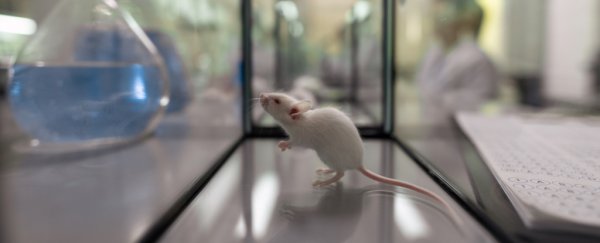It sounds like something that might have come out of a sci-fi novel, but it's based on cold, hard, printed research: transplanting fecal microbes from young mice into old mice seems to reverse key signs of aging in the guts, eyes, and brains of the older animals.
Further experiments showed that it works the other way too – moving microbes from the poop of aged mice into younger mice caused the younger animals to then show signs of aging, including increased inflammation in the brain and a reduction in a key protein needed for normal vision.
It's by no means a recipe for eternal youth, but as we get older we naturally become more susceptible to wear, tear, and disease – in part due to the way our guts degrade. These experiments show that something could be done about that, although only mice guts have been tested so far.
"Here, we tested the hypothesis that manipulating the intestinal microbiota influences the development of major comorbidities associated with aging and, in particular, inflammation affecting the brain and retina," write the researchers in their published paper.
Increased inflammation around the brain and the retinas in the eyes tends to happen as we get older, while age-related chronic inflammation – called 'inflammaging' – has been linked to specific immune cells.
When the poo microbes were transferred from young to old mice, this inflammation showed signs of reversing. When the transplant was moved the other way, signs of gut aging and inflammation began to appear in the younger mice.
These signs included a loss of integrity in the gut lining (so bacteria could pass into the blood), elevated levels of proteins associated with retinal degeneration, and the over-activation of the immune cells that are tied to inflammaging.
"Our results demonstrate that the age-associated changes in the murine intestinal microbiota contribute to disrupted gut barrier integrity and systemic and tissue inflammation affecting the retina and the brain, but these changes can be reversed by replacement with young donor microbiota," write the researchers.
Scientific studies are giving us more and more of an understanding about all the different ways that our gut microbes are linked to our health – whether that's mental health issues such as anxiety or physical health issues like obesity.
In other words, the mix of bacteria in our bellies really matters, and changing that mix – whether through diet or fecal transplants – has the potential to bring about a variety of different health benefits.
Now there's another option worth exploring for researchers. Future studies are planned to look at how long the positive impacts of these fecal transplants might last for, and which gut microbes in particular are controlling the effects that are being seen. Then, scientists can start to explore whether it could work in humans too.
"This ground-breaking study provides tantalizing evidence for the direct involvement of gut microbes in aging and the functional decline of brain function and vision and offers a potential solution in the form of gut microbe replacement therapy," says gut biologist Simon Carding, from the University of East Anglia in the UK.
The research has been published in Microbiome.
